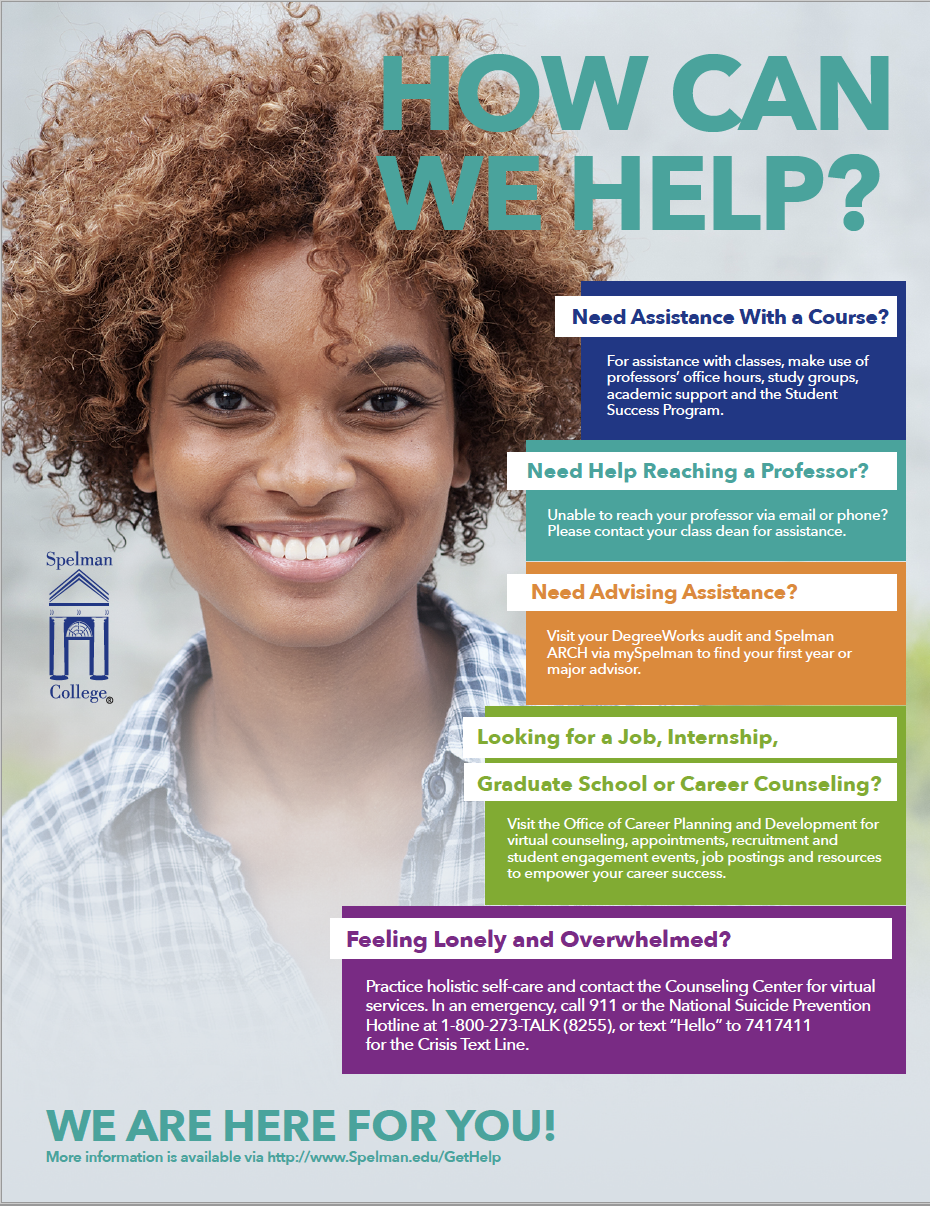Attend your professor’s office hours.
Office hours are a great resource for helping you succeed in your courses. Take advantage of the time your professor has reserved for you to ask questions, work problems and review topics.
Regularly engage with your first-year study group.
If you are a first-year student, your study group lead is a dedicated source of course support. If you have any questions about your first-year study group, please contact Brandi Reese.
Seek virtual academic support.
Academic assistance and tutoring are available through nine virtual centers and programs. For virtual academic support schedules, self-enroll in the Student Success Program Moodle course.
Contact Student Success Program.
The Student Success Program will assist you in identifying academic support for your courses. To get assistance with a course or meet with an academic coach, please email SSP for a response within one business day.
If you are unable to reach your faculty member via email or phone, please contact your class dean for assistance.
 First year students have been assigned a first-year advisor. Your advisor’s name is posted in your DegreeWorks audit and in the Spelman ARCH. Both can be accessed via mySpelman. Major advisors are also listed in DegreeWorks and the Spelman ARCH. If you have difficulty reaching either your first-year advisor or major advisor, please contact your class dean.
First year students have been assigned a first-year advisor. Your advisor’s name is posted in your DegreeWorks audit and in the Spelman ARCH. Both can be accessed via mySpelman. Major advisors are also listed in DegreeWorks and the Spelman ARCH. If you have difficulty reaching either your first-year advisor or major advisor, please contact your class dean.
The Office of Career Planning and Development offers virtual counseling, appointments, recruitment and student engagement events, job postings, and other ways to provide you with information and resources to empower your career success. Please visit the office's web page for more information.
Student Success Program
350 Spelman Lane, S.W., Milligan Building, Room 2312
Atlanta, Georgia 30314
404-270-5610
ndixon1@spelman.edu
or ssp@spelman.edu
Mon. - Fri. | 9 a.m. - 5 p.m.
The mission of The Office for Veteran and Military Affairs is to provide, facilitate, or coordinate programs and services to meet the special needs of veterans, service members, dependents, and survivors in order to ease their transition to college life and fulfill their educational goals.
Building remote communities of healthy relationships, self-care measures and engaging in counseling can help decrease loneliness, stress and feeling overwhelmed.
Holistic self-care includes practicing:
Physical Self-Care: Establish a schedule for sleeping at least eight hours a day, incorporate physical activity, and pay attention to your nourishment.
Emotional and Spiritual Self-Care: Actively practice being optimistic such as establishing a personal gratitude log, setting achievable goals, honoring, and making time for your values, being still, meditating, refraining from the media, and seeking counseling support.
Social Self-Care: Know your boundaries, learn to say “no,” and determine different and healthier ways to remain socially connected, while practicing physical distancing. For additional self-care tools, please visit the Counseling Center web presence for Self-Help Resources.
Self-care measures may not always work for everyone or for all situations. The next step is to reach out for professional counseling support. The Counseling Center team can guide you in this process. Contact the Counseling Center at 404-270-5293, Monday through Friday, 9 a.m. to 4:30 p.m., to schedule an appointment or ask to speak with a clinician. Our therapists can also assist in locating a community-based therapist in your area of residence. For more information, please visit the Counseling Center's web presence.
Acknowledging the unprecedented period, we are now living in, there are times when feelings of paralyzing loneliness or being completely overwhelmed may erupt, leading to a mental health crisis. If you or someone you know experiences an emergency and needs immediate assistance, please get help.
Call 911 if you or someone you know is in immediate danger or go to the nearest emergency room.
Contact the National Suicide Prevention Lifeline or call 1-800-273-TALK (8255); En Español 1-888-628-9454
This resource is a free, confidential crisis hotline available to everyone 24 hours a day, seven days a week. The Lifeline connects callers to the nearest crisis center in its national network. These centers provide crisis counseling and mental health referrals. People who are deaf, hard of hearing, or have hearing loss can contact the Lifeline via TTY at 1-800-799-4889.
Contact the Crisis Text Line or text "HELLO" to 741741
The Crisis Text hotline is available 24 hours a day, seven days a week throughout the U.S. This resource serves anyone, in any type of crisis, connecting them with a crisis counselor who can provide support and information.
It's time to explore our beautiful campus! Sign-up today, bring your family, and let us show you what will make Spelman College your home away from home!